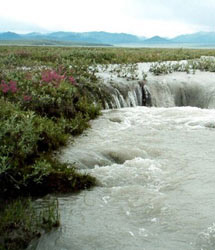 |
 |
 |
 Editorials | Environmental | October 2005 Editorials | Environmental | October 2005  
Energy Failure
 NYTimes NYTimes


| | The Senate Energy and Commerce Committee approved a measure on Wednesday to open the coastal plain of the Arctic National Wildlife Refuge to oil and gas production. The plain is a way station on the annual migration of thousands of caribou and many more migratory birds that rely on the fresh water of northward-flowing rivers and streams. (Photo: US Fish and Wildlife) |
President Bush's habitual response to energy-related problems like oil dependency is to try to increase supply rather than to cut demand through energy efficiency. The imbalance is getting worse as Congress rushes to open up the Arctic National Wildlife Refuge to oil exploration. Meanwhile, the Interior Department is leasing out more fragile public land than the oil and gas companies know what to do with in the Rocky Mountain West.

The administration's conservation strategy, by contrast, consists mainly of gestures, like Treasury Secretary John Snow's pledge to ride the train to New York instead of flying the shuttle, and the Energy Department's chirpy consumer-education program featuring a cartoon villain called Energy Hog. As we learned long ago when President Gerald Ford started passing out those WIN (Whip Inflation Now) buttons, a policy that rests solely on slogans and mascots is no policy at all.

Obviously we can't expect this administration to turn on a dime and start supporting big increases in automobiles' fuel economy. But Mr. Bush has also ignored less controversial measures.

Last month, Attorney General Eliot Spitzer of New York joined with the Natural Resources Defense Council and others in a suit against the Energy Department because it has repeatedly ignored deadlines to review and strengthen efficiency standards for 22 products and appliances, including room air-conditioners and furnaces.

Congress requires periodic upgrades because technology gets better all the time. The first President George Bush strengthened 5 efficiency standards; President Bill Clinton strengthened 11. This administration hasn't strengthened any. Indeed, it tried unsuccessfully to roll back standards for central air-conditioners.

The energy savings from updated standards would not be trivial at a time when prices for oil and natural gas have zoomed. New standards for furnaces and boilers alone could save about 3 percent of the oil and 6 percent of the natural gas used to heat American homes. The electricity savings could equal the output of 40 power plants, and the value to consumers could amount to about $6,000 per household by 2020.

There's nothing inherently wrong with Energy Secretary Samuel Bodman's campaign to persuade consumers to reduce energy use voluntarily. But he should give them efficient products to work with. | 
 | |
 |



